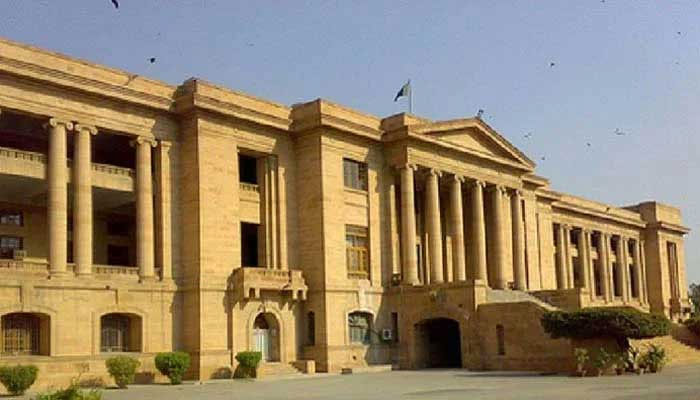SHC dismisses pleas against tax on foreign assets
The SHC dismissed identical petitions that challenged imposition of tax in respect of foreign assets of a resident individual, including moveable and immovable properties
KARACHI: The Sindh High Court on Friday dismissed identical petitions that challenged imposition of tax in respect of foreign assets of a resident individual, including moveable and immovable properties.
The petitioners have assailed the vires of the section 8 (2) (b) of the Finance Act 2022, whereby a tax has been levied on the value of assets for tax year 2022 and onwards in respect of foreign assets of a resident individual which includes moveable and immoveable properties.
The petitioners’ counsel submitted that the parliament is not competent to levy the impugned tax on immovable properties located abroad and the powers of the parliament pursuant to 18th amendment to the Constitution are now curtailed in respect of levying any tax on immovable properties.
They submitted that the imposition of tax on foreign assets was not within the competence of the parliament as it cannot even legislate in respect of properties outside the territorial limits of Pakistan.
The federal government and the FBR counsel submitted that the petitioners have availed amnesty under the Foreign Assets Act, which was also legislated by the parliament in respect of immoveable properties. Therefore, the petitioners cannot object as to the competence of the parliament that the capital value of a property located abroad can be taxed by the parliament pursuant to Articles 141 and 142 read with Article 97 of the Constitution.
They submitted that the federal government can levy such tax as provinces cannot legislate in respect of immovable properties located abroad.
The SHC’s division bench headed by Justice Mohammad Junaid Ghaffar, after hearing the arguments of the counsel, observed that the concept of taxation in respect of foreign income is now a worldwide phenomenon and majority of the countries have incorporated the provisions relating to taxing incomes of resident persons.
The court observed that admittedly, the foreign income is not earned within the territorial jurisdiction of Pakistan but in terms of constitutional provisions which empower the parliament to levy taxes on income of a resident person as his income abroad is also taxed and such tax has never been disputed before the court.
The court observed that the petitioners as well as other taxpayers availed amnesty under Foreign Assets (Declaration and Repatriation) Act, 2018, and after paying requisite tax, they declared these properties under their Wealth Tax Returns.
The court observed that these assets are now part of the Wealth Tax Returns of the resident taxpayers, therefore, even otherwise there is a nexus of these properties with the income and wealth of the resident taxpayers and there appears to be no impediment for the parliament to levy the tax in question.
The court observed
that the petitioners’ counsel did not raise substantial arguments as to the impugned levy being ultra vires to the Constitution or otherwise the parliament is not competent to levy such tax on moveable foreign assets.
The bench observed that it did not see any justifiable reason to declare the provisions of Section 8 of the Finance Act, 2022, as ultra vires to the Constitution.
-
 Jessica Alba, Cash Warren Finalize Divorce After 16 Years Of Marriage
Jessica Alba, Cash Warren Finalize Divorce After 16 Years Of Marriage -
 China’s AI Boom Takes Center Stage At Spring Festival One Year After DeepSeek Stirred The Industry
China’s AI Boom Takes Center Stage At Spring Festival One Year After DeepSeek Stirred The Industry -
 James Van Der Beek Called His Sixth Child Jeremiah 'healing For Us' Before His Death
James Van Der Beek Called His Sixth Child Jeremiah 'healing For Us' Before His Death -
 Elon Musk Vs Reid Hoffman: Epstein Files Fuel Public Spat Between Tech Billionaires
Elon Musk Vs Reid Hoffman: Epstein Files Fuel Public Spat Between Tech Billionaires -
 Gordon Ramsay Denies Victoria Beckham Got Handsy With Brooklyn At His Wedding
Gordon Ramsay Denies Victoria Beckham Got Handsy With Brooklyn At His Wedding -
 Gordon Ramsay Makes Unexpected Plea To Brooklyn As He Addresses Beckham Family Feud
Gordon Ramsay Makes Unexpected Plea To Brooklyn As He Addresses Beckham Family Feud -
 Prince Harry Warns Meghan Markle To 'step Back'
Prince Harry Warns Meghan Markle To 'step Back' -
 Selena Gomez Explains Why She Thought Lupus Was 'life-or-death'
Selena Gomez Explains Why She Thought Lupus Was 'life-or-death' -
 New Zealand Flood Crisis: State Of Emergency Declared As North Island Braces For More Storms
New Zealand Flood Crisis: State Of Emergency Declared As North Island Braces For More Storms -
 Nancy Guthrie Case: Mystery Deepens As Unknown DNA Found At Property
Nancy Guthrie Case: Mystery Deepens As Unknown DNA Found At Property -
 James Van Der Beek's Brother Breaks Silence On Actor's Tragic Death
James Van Der Beek's Brother Breaks Silence On Actor's Tragic Death -
 Megan Thee Stallion On New Romance With Klay Thompson: 'I'm Comfy'
Megan Thee Stallion On New Romance With Klay Thompson: 'I'm Comfy' -
 Nicole Kidman Celebrates Galentine’s Day Months After Keith Urban Split
Nicole Kidman Celebrates Galentine’s Day Months After Keith Urban Split -
 Justin Bieber Unveils Hailey Bieber As First Face Of SKYLRK In Intimate Campaign Debut
Justin Bieber Unveils Hailey Bieber As First Face Of SKYLRK In Intimate Campaign Debut -
 Caitlin O’Connor Says Fiance Joe Manganiello Has Changed Valentine’s Day For Her
Caitlin O’Connor Says Fiance Joe Manganiello Has Changed Valentine’s Day For Her -
 Rachel Zoe Sends Out Message For Womne With Her Post-divorce Diamond Ring
Rachel Zoe Sends Out Message For Womne With Her Post-divorce Diamond Ring




